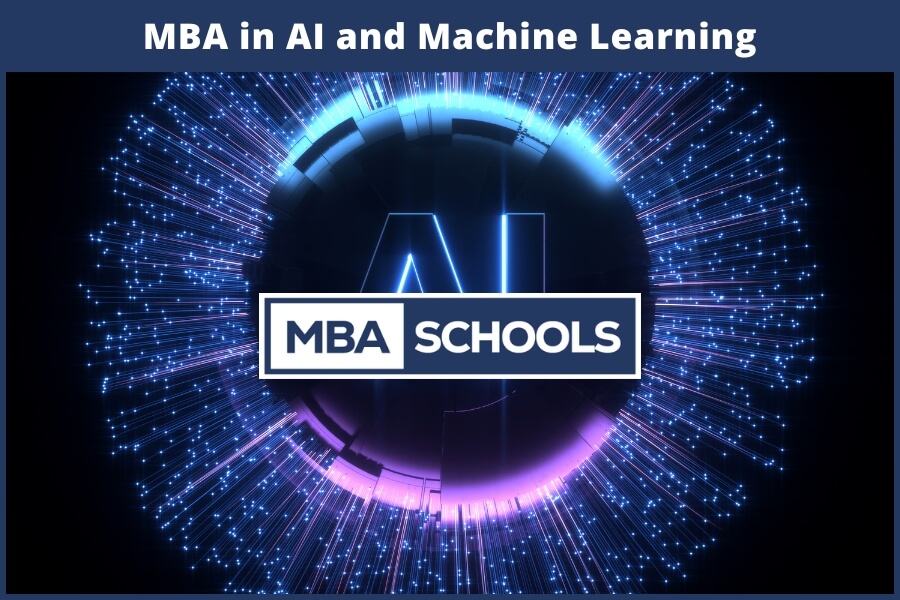MBA in Artificial Intelligence (AI) and Machine Learning
An MBA in Artificial Intelligence (AI) and Machine Learning is designed for professionals who want to lead AI-driven business strategies, automation, and innovation. This specialization focuses on machine learning, neural networks, AI ethics, and business intelligence, equipping graduates with the expertise to drive AI adoption and digital transformation in finance, healthcare, technology, and consulting industries.
According to the World Economic Forum (WEF), AI and automation will create 97 million new jobs globally by 2025, making AI expertise one of the most sought-after skills in the business world ( WEF). Additionally, the U.S. Bureau of Labor Statistics (BLS) reports that AI and machine learning professionals earn a median salary of $131,490, reflecting the growing demand for AI-driven business leadership ( BLS).
An AI & Machine Learning MBA specialization is ideal for professionals leveraging artificial intelligence, deep learning, and automation to enhance business strategy and efficiency.

Table of Contents
What is an Online MBA in AI & Machine Learning?
An Online MBA in AI & Machine Learning provides a flexible pathway for professionals looking to develop expertise in AI-powered automation, deep learning, and intelligent business applications while maintaining their careers. These programs focus on AI-driven decision-making, data science, and business intelligence, preparing students for AI development and deployment leadership roles.
Students gain expertise in natural language processing, neural networks, and AI integration for business, ensuring they can optimize operations, enhance customer experiences, and drive innovation. Many online programs include real-world AI case studies, automation labs, and deep learning projects, providing hands-on experience with AI implementation.
What Are the Admissions Requirements for an MBA in AI & Machine Learning?
Admissions requirements for an MBA in AI & Machine Learning vary by program, but typically include:
- Bachelor’s Degree – From an accredited institution, often in business, computer science, engineering, or a related field.
- Work Experience – 2-5 years of professional experience in AI, IT, data science, or business analytics is preferred.
- GMAT/GRE Scores – Some programs require standardized test scores, while others offer waivers.
- Personal Statement – Discussing career goals and why the applicant is pursuing an MBA in AI & Machine Learning.
- Letters of Recommendation – Typically from employers, AI leaders, or academic mentors.
- Resume – Highlighting experience in artificial intelligence, machine learning, or data-driven business strategy.
Is an MBA in AI & Machine Learning the Right Specialization for You?
An MBA in AI & Machine Learning specialization is best suited for analytical, tech-savvy professionals interested in AI-driven business transformation. If you are passionate about predictive analytics, automation, and leveraging AI for strategic decision-making, this specialization will provide the tools needed for career success.
Compared to other MBA specializations, such as Data Science or Business Analytics, an AI & Machine Learning MBA focuses on deep learning, neural networks, and AI-driven automation. If you want to develop AI-powered business models and optimize operations through machine learning, this program may be your best fit.
MBA in AI & Machine Learning Curriculum: What Classes Will I Take?
Most MBA in AI & Machine Learning programs take 1-2 years to complete, depending on whether students enroll full-time, part-time, or in an accelerated format.
Core Courses in an MBA in AI & Machine Learning
The curriculum for an AI & Machine Learning MBA specialization blends advanced AI techniques with business leadership through courses such as:
- Artificial Intelligence for Business Strategy
- Machine Learning & Predictive Analytics
- Deep Learning & Neural Networks
- AI-Driven Automation & Process Optimization
- Natural Language Processing (NLP) & AI Ethics
- Business Intelligence & AI-Enhanced Decision-Making
- Cloud Computing & AI Infrastructure
- Robotics & IoT in Business Applications
Many programs also incorporate real-world AI projects, including deep learning model development, AI-driven automation simulations, and AI integration for business operations. Some students complete internships with major tech firms, AI research labs, or financial institutions to gain practical experience before graduation.
What Career Options Do I Have with an MBA in AI & Machine Learning?
An AI & Machine Learning MBA specialization prepares graduates for leadership roles in AI-driven industries. Job titles include:
- Chief AI Officer (CAIO) – Oversees AI adoption and strategy across an organization.
- Machine Learning Engineer – Develops and implements AI-driven algorithms and automation solutions.
- AI & Business Intelligence Director – Leads AI-driven corporate analytics and machine learning initiatives.
- Automation & AI Strategy Consultant – Advises companies on AI implementation and process automation.
- AI Ethics & Compliance Manager – Ensures responsible AI deployment and regulatory compliance.
Salary Expectations
Salaries for MBA in AI & Machine Learning graduates vary based on industry, experience, and expertise. According to BLS and WEF, AI professionals with an MBA typically earn:
- Chief AI Officer (CAIO) – $220,000+
- Machine Learning Engineer – $130,000 – $190,000
- AI & Business Intelligence Director – $140,000 – $200,000
- Automation & AI Strategy Consultant – $120,000 – $170,000
- AI Ethics & Compliance Manager – $110,000 – $160,000
Take the Next Step Toward an AI-Driven Leadership Role
An MBA in AI & Machine Learning provides the expertise to develop and implement AI-driven strategies, optimize business operations, and lead digital transformation initiatives. Whether you want to drive AI innovation, enhance automation, or develop ethical AI frameworks, this degree will give you the knowledge, skills, and network to achieve your career goals.
Explore top-ranked MBA in AI & Machine Learning programs today and advance your career.
Sources
- U.S. Bureau of Labor Statistics. (2023). Occupational Outlook Handbook: AI & Machine Learning Careers. Retrieved from https://www.bls.gov/
- World Economic Forum (WEF). (2023). The Future of AI & Automation in the Workforce Report. Retrieved from https://www.weforum.org/